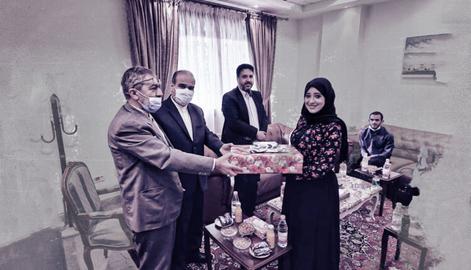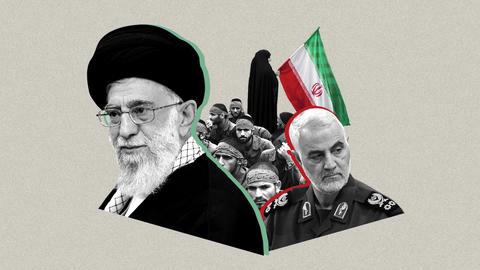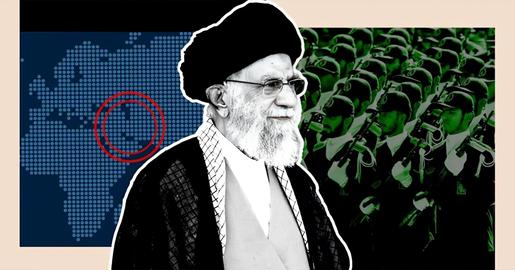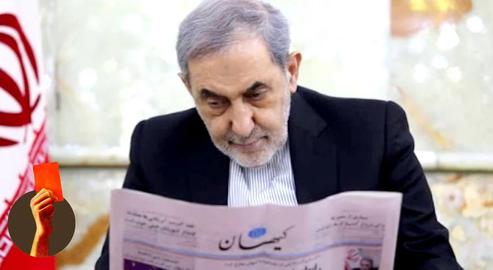Videos recently shared online purporting to show Algerian citizens announcing their conversion to Shia Islam have sparked suspicion about Iran’s influence in the country. They appeared to suggest, if nothing else, that a movement to boost Shia numbers in the north African country is very much alive.
Iran’s efforts to spread Shiism in Algeria, both covertly and publicly, began in the 1980s: a time when the Islamic Republic had a growing interest in spreading its brand of Shia Islam to the Middle East and Africa.
These video clips have not been verified, and the individuals involved have their faces covered. They claim to have converted after watching debates between Shia clerics on talkshows broadcast on television or on YouTube. IranWire spoke to three expert sources, Algerian lawyer Ismail Khalafallah, an Algerian journalist specializing in religious affairs, and the scholar Dr Abdelmalik Saouli, who all confirmed that in any event, a Shia expansionist wave is coursing through nourth Africa.
Tehran’s Historic Meddling in Algerian Affairs
In the aftermath of the 1979 Iranian Revolution, the newly-born Islamic Republic established “exporting the revolution” as one of the basic principles guiding foreign policy: an attempt to inspire revolutions like the one in Iran in countries ruled by authoritarian leaders, and expand the regime’s own geopolitical influence.
Tehran began its formal attempts to spread Shiism in Algeria in the early 1980s, exploiting the sympathy many Algerian people then had for the Islamic Revolution. Dr. Abdelmalik Saouli, a university professor specializing in Islamic media, notes that Iran’s expansionist zeal came at a time when Algeria was gaining its independence from France. The anti-imperialism embedded in the movement, as well as its anti-Zionist tendencies, meant Iran could infiltrate Algerian society with relative ease. Tehran took advantage of Algerians’ sympathy, and made efforts to attract elite individuals and groups with influence in Algerian society to the cause.
Khalafallah adds that a particular Islamic scholar in Algeria known for his influential rhetoric had become fascinated with Iran and what had been happening there, and so decided to visit. He stayed for months, and returned to his home country with a passion to spread Shia Islam among his fellow citizens, promoting it in mosques and religious educational institutions. But it wasn’t long before authorities began to notice, and they regarded him and his agenda as a threat, and soon expelled from his city.
Later, during the Algerian Civil War (1991-2002), Algeria accused Tehran of giving financial support, training and weapons to the armed wing of the Islamic Salvation Front: a claim backed up by subsequent research and documentation. The Algerian authorities confronted Iranian officials, repeatedly ordering them to discontinue their support for the group, and in 1993, Algeria expelled Iran’s ambassador to the country and ordered the return of its own ambassador from Tehran. Ties between the two countries were severed, a situation that continued until President Bouteflika came to power in 1999.
Later, in the aftermath of the 2006 war between Lebanese Hezbollah and Israel, the push for Shia Islam in Algeria resurfaced. According to an Algerian journalist, who asked to use the pseudonym Lakhdar Mabrouk, many Algerians sympathized with Hezbollah, which was backed by Iran and Syria.
In the years that followed what many regarded as a victory for Hezbollah, and with the outbreak of pro-democracy uprisings in Syria in 2011, Syria became the destination for many Algerians wanting to convert to Shiism. Mabrouk described how Algerians “met there with Shia clerics and then returned to Algeria to build networks to spread the new doctrine.”
Some of these networks had direct contact with the Iranian embassy in Algeria, he said. “In 2012, Algeria witnessed an unprecedented wave of Algerian figures who had converted to Shiism running for various posts in the country’s legislative elections and some of them landed powerful positions.”
This, in addition to the growing popularity of the Shia movement in the country in general, prompted Abdelfattah Hamadache Zeraoui, then head of the Salafist Awakening Front in Algeria and a key figure in the wider Salafist movement, to launch a campaign against what he called “the rising Shia tide in Algeria”, declaring: “Shias pose a threat to Algeria and therefore must be curbed with a counter-movement.”
The End of the Clandestine Period
In November 2015, the leader of the Sadrist movement in Iraq, Muqtada al-Sadr, urged followers of Shiism in Algeria to “not retreat and not be afraid, and to work to unite the ranks with the moderates and other minorities”, against what he called the “stray group”: a reference to the Sunni component in Algeria.
Al-Sadr's statements came after Tehran appointed Amir Mousavi as cultural attaché at its embassy in Algeria at the beginning of 2015, and coincided with growing public activity from the Shia movement in Algeria.
According to Khalafallah, “There was no clearly-defined Shia movement in Algeria until the so-called Iranian cultural attaché Amir Mousavi came and started cultural exchange programs that aimed to spread Shiism through mosques and educational institutions. Mousavi toured the country and visited all Algerian cities under the pretext of cultural exchange... Shortly after Mousavi arrived in Algeria in early 2015, we discovered his secret agenda and launched a campaign to expel him from the country because of his suspicious work.” This campaign continued to spread widely in 2018 following Mousavi’s increased activities.
This encouraged many new Algerians who had converted to Shiism between 2014 and 2018 to make videos of themselves taking in part in Shia rituals, including self-flagellation, and to share them on social media. Mabrouk said this signaled the end of the clandestine period for Shiism in the country. "Tehran was able to draw the attention of Algerians and the world to the movement to spread Shiism in Algeria.”
In November 2017, the Algerian government arrested more than 400 Algerian citizens returning from Iraq and Iran, where they had taken part in the Ashura rituals, sparking fears across the country. The move made clear the Algerian government's position on Shia expansion.
However, this did not put an end to the movement, especially because the Algerian government did not firmly challenge the activities of the Iranian cultural attaché Amir Mousavi.
In January 2016, months after the campaign to expel Mousavi was launched, Algerian Minister of Religious Affairs and Endowments Mohamed Issa stated that the Algerian authorities had not observed any violations by the Iranian embassy in Algeria regarding the promotion of Shiism in Algerian society. He added, "We are in contact with the Iranian embassy in Algeria,” he said, “but we did not detect any involvement of the embassy regarding spreading Shiism.”
In September 2018, Mousavi left Algeria. It was not clear if this was at the request of the government following the growing wave of public anger, or whether the latter was recalled by his own government. But following that, the Shia movement in Algeria regressed to its clandestine stage, Mabrouk said.
Why Algeria?
Although the Iranian Shia movement does not target the Middle East and North Africa specifically — it is also active in the Americas, Europe, and other countries — Tehran has particular motives for spreading its doctrine in Algeria.
There is a long history of Shiism in Algeria, extending from the period of Idrisid rule, when the Algerians sympathized with Ahl al-Bayt (the Prophet Muhammad’s extended family) against their opponents from the Abbasids, especially around the second century of Hijrah (when the Prophet migrated from Mecca to Yathrib).
Algeria embraced the Fatimid state with the same sympathy as it had treated Ahl al-Bayt, except that Shiism in Algeria did not conform to the Jafari school (Twelver doctrine) of jurisprudence. There were major differences between the scholars of the Maliki school (the doctrine of Imam Malik bin Anas, which is the doctrine the majority of people in Algeria follow) and the authorities of the Fatimid state, which resulted in the expulsion of the Fatimids from Algeria.
From a strategic point of view, Mabrouk said, Iran’s interest in Algeria could also be attributed to the former’s regional ambition in the Maghreb, which would help Iran build a Shia popular base in northwestern Africa with which to threaten opponents in the region, especially its old rival, Morocco.
Why Did the Movement Fail?
In Khalafallah’s view, the Shia movement in Algeria failed because Algerian society is so heavily influenced by the Maliki school of thought. He added that, today, the Shia movement doesn’t really exist because its followers lack the confidence to come out in public.
"The Shia movement has no serious impact on Algerian society at the moment,” Saouli agreed. "With regard to practicing public rituals, it is difficult to determine their effects since they are not publicly practiced for fear of being targeted.”
In January 2016, the Algerian Minister of Religious Affairs, Mohamed Issa, was asked about the Shia movement in Algeria and the campaign to expel the former Iranian cultural attaché Amir Mousavi. He replied that the Algerian authorities kept track of all converts to Shia Islam in the country. But he gave no indication of how many people this was.
Anwar Malik, an Algerian writer known for his activism against the Shia movement, stated in an article in 2010 that he counted 3,000 Shias in Algeria, referring to what he described as “reliable and documented information,” from 40 out of 48 states in the country.
At the end of 2014, Malik said the number of Shias in Algeria had reached 5,000, which, in his opinion, indicates “the systematic Iranian focus on Algeria, and the complete absence of the Algerian authorities” in monitoring the situation. He added: "Unfortunately, the authorities are trying to underestimate Shiism, and accuse those who speak against it of exaggerating, and this of course only serves Iran, and means it carries out its missionary work in complete silence and comfort, away from the public eye, which leads to official or popular pressures.”
In a study conducted by Dr Abdelmalik Saouli for his doctoral thesis, he concluded that between one and three percent of students in Algeria follow Shiism, some of them following the Jafari school of jurisprudence specifically. He added: "This is a really frightening number, especially when students are the ones who adopt such ideas.” This, Saouli believes, should prompt the authorities to “review the curricula and introduce some standards to protect the young from those movements."
Means of Spreading Shia Islam in Algeria
The experts IranWire spoke to all said Shiism is spreading in various parts of Algeria to varying degrees, most actively in the country’s western states. “There is activity in some cities in western Algeria where followers perform rituals and ceremonies, but this is confined to a limited number of homes and does take place in public,” Khalafallah said. “There were a few attempts [to convert people] in the capital, and groups working to spread Shiism were active in cities in eastern Algeria. Pamphlets and brochures were circulated in the capital and cities in eastern Algeria too.”
Leaders of the Shia movement use a range of tactics to spread their doctrine, he said, including: “exploiting the victories achieved by Iran and Hezbollah in the region in addition to attracting individuals through money, or other temptations, such as ‘temporary marriage’ [to make sexual activity legally permissible] to attract young people.” Khalafallah added: “The cultural activities and trips that took place through the embassy during Amir Mousavi’s presence were the most prominent tools for spreading Shiism at that time.
“The Iranian authorities knew very well that this was a very sensitive issue for authorities in Algeria, and that spreading Shiism will be met with absolute rejection, so I think Iranian officials are very reserved now because they want to maintain a good relationship with Algeria.”
This motive was echoed by journalist Mabrouk: “The Iranian official role may have weakened, but the unofficial networks established internally by Amir Mousavi, as well as Shiite clerics in Iran and Iraq, are still working to spread Shiism secretly.”
Related coverage:
Iran’s International Propaganda Machine: The Arbaeen March
Iran’s Overseas Propaganda: How Hezbollah Courted Argentina
Hezbollah Supporters Running Kids’ Scouting Groups in Brazil
Iran’s Overseas Propaganda: A Copycat Movement in Nigeria
Iran's Overseas Propaganda: A Poor Harvest in Bosnia and Herzegovina
Is Tehran Leveraging 'National and Popular Islam' in South America?
Al-Mustafa University: Exporting the Islamic Revolution, One Scholarship at a Time
visit the accountability section
In this section of Iran Wire, you can contact the officials and launch your campaign for various problems






















comments